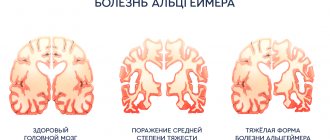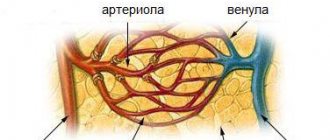When a patient is diagnosed with Alzheimer's disease, the diagnosis is permanent. When people learn about such an unpleasant diagnosis and manifestations of the disease, the question often arises: is Alzheimer's disease a disability? It would also be useful for patients and their relatives to know what benefits are available for such a disease.
Disability and Alzheimer's
There are certain factors that are grounds for recognizing a person as disabled due to illness:
- severe disorders of body functions;
- partial or complete loss of self-care skills and ability to move;
- disturbances in orientation in time and space;
- uncontrolled behavior;
- loss of ability to work;
- loss of communication skills;
- need for constant care and rehabilitation.
All these signs are characteristic of Alzheimer's and progress as it moves to new stages, making Alzheimer's disease and disability interrelated almost from the very beginning of the development of the pathology.
Today, Alzheimer's pathology is incurable, and the disease gradually turns a person into a helpless patient, unable to cope without constant care. In addition, manifestations of the syndrome make a person dangerous to himself and others.
Forecast
Life expectancy after the first symptoms of Alzheimer's disease appear depends on many factors.
There are two forms of the disease:
The senile form develops in most cases after 65 years.
It is characterized by gradual, slow memory loss. In this case, the patient lives approximately 10-15 years, sometimes 20.
The presenile form can appear after 50 years , and sometimes even before this age. Progress in this case is faster than in the senile form.
Many cognitive functions begin to suffer rapidly, one after another. The patient lives 8-10 years .
By the way, women are diagnosed with this disease much more often than men. This may be due to the fact that women live longer.
How long people with Alzheimer's disease live largely depends on the treatment and actions of relatives: if you pay enough attention to the patient, develop him (draw with him, learn words, try to recall certain events or people), then he will live much longer.
If a person becomes bedridden, buy him special diapers, since he will no longer be able to go to the toilet on his own.
The patient needs to be fed porridge-like food, since he is unlikely to be able to eat on his own. This is due to the fact that the disease causes problems with swallowing .
Sometimes it comes to the point that you have to feed a person using a tube. Be careful and watch how the patient manages to eat.
In general, the forecast is disappointing . This diagnosis always leads to death, but you can prolong the life of your ward if you follow the recommendations.
Disability group for the syndrome
In case of Alzheimer's disease, disability of group I or II is given depending on the stage of the disease and the patient's condition. In cases where the diagnosis of Alzheimer's disease has already been established, but the pathology has not yet manifested itself in full force (the patient has the ability to assess his condition), disability group II is most often given. This decision is due to disappointing forecasts for the further development of the disease.
Disability with Alzheimer's, which has passed into the moderate or severe stage, corresponds to group I. At this stage, the patient can no longer do without constant care and expensive medications, the benefits on which are relied upon when determining the disability of this group.
Alzheimer's disability group II
Usually, with this syndrome, group II is only temporary until more serious symptoms of the pathology appear. The second disability group for Alzheimer's disease is established by the commission if the patient has functional impairment of the third degree. This includes:
- behavioral disorders;
- disturbance of orientation in time and space;
- problems with long-term and short-term memory;
- maintaining self-care and communication skills.
Disorders of this nature are observed in the stages of pre-dementia and early dementia of Alzheimer's syndrome.
Alzheimer's disability group I
Alzheimer's disease allows you to register disability according to the criteria for group I. This level of disability is the most severe. It is installed when functional disorders of the IV degree are detected, which include:
- extremely inappropriate behavior with attacks of aggression;
- lack of orientation in time and space;
- complete loss of memory;
- inability to perform purposeful actions;
- severe speech disorders;
- loss of writing skill;
- helplessness, lack of self-care skills;
- loss of communication skills;
- exhaustion;
- loss of interest in everything;
- gradual loss of the swallowing reflex.
Similar abnormalities are observed in the moderate to severe stages of Alzheimer's dementia.
How to help a patient
It is difficult to care for a patient who has lost his mind. The experience gained by doctors and relatives of patients will help cope with this difficult problem.
- It has been noted that the symptoms of the disease are aggravated by several factors:
- Darkness frightens the patient, so leave a night light on in the room.
- Overheating and loss of fluid provoke aggression. In the patient’s room, set the optimal temperature to 20–22 °C and air humidity to 50–70%.
- An unfamiliar environment provokes restless behavior and suspicion.
- Prolonged loneliness causes increased depression. Communicate with the patient.
- Contacts with strangers make you feel worse.
After eliminating these issues, a person with Alzheimer's disease feels calmer.
Tips for caring for relatives
The patient's room should be clean and ventilated. The following actions help make the patient’s life easier:
- When feeding, remind him to take a spoon in his hand and scoop up the soup. If he likes to eat with his hands, prepare food accordingly. Prefer dishes without pictures. After finishing the meal, demonstrate how to wipe your mouth with a napkin. Socializing while eating reduces depression.
- Serve water and drinks in a half-filled mug.
- Do not bathe the patient in the shower - the sound of falling water frightens him.
- The patient does not always feel the need to go to the toilet - get used to the routine at certain hours. Bowel function will become a biological habit.
- Remove the mirror in the bathroom and toilet - a person may be afraid of his image. Turn on the bathroom lights in advance.
- If the patient is able to dress, provide clothing in order of priority, encouraging independent activity.
The procedure for registering disability
In order to receive disability for Alzheimer's disease in Russia, you must go through a procedure that includes several stages.
- Registration of a power of attorney. If the collection of documentation to establish disability is not carried out by the patient himself, then it is necessary to make a power of attorney certified by a notary.
- Obtaining a referral for a medical and social examination (MSE). You must make a written request addressed to the chief physician at the clinic at your place of residence, in which you must indicate the most complete information about the patient. For example, be sure to list the rehabilitation tools that the patient needs. Most often, the request is considered within 7 days and a decision is made on whether to send the patient for an examination or to refuse the request.
Important! Even if a request for a referral is refused, the patient has the right to independently go for a medical and social examination, having prepared the same set of documents!
- Submission of documents to the local branch of the ITU Main Bureau. In addition to receiving a referral from a medical institution, you will need:
- power of attorney certified by a notary or the chief physician of the hospital where the patient is staying (if necessary);
- application for disability;
- passport (of the patient and the person involved in registration);
- all kinds of medical reports on the patient’s health status, test results, ECG and fluorography (additional examinations may be required, which will be reported to the medical and social examination bureau);
- for bedridden patients, a conclusion from the medical commission of a medical institution is required about the impossibility of visiting the office due to poor health;
- For a person working with the syndrome, a professional reference from a previous place of employment is required.
After successfully passing the examination, the patient receives a certificate confirming the disability group, an individual rehabilitation program and the entry of the commission’s decision into the list of temporary disability (if any). They also issue a certificate of examination, which is needed to receive benefits and a pension.
If a person is refused recognition as a disabled person, they are given a certificate with the result of the examination (or informed orally) and a note about the ITU decision is made on the sick leave certificate (if any). A negative response can be contested within one month by contacting the ITU Main Bureau for re-examination. To do this, send an application to the head of the bureau, a certificate with the ITU refusal and medical reports on the patient’s health.
Prices for diagnosing senile dementia
Senile dementia is a senile dementia that affects people in the older age group. The initial stage of the disease is manifested by forgetfulness, fatigue, and apathy. Later stages of the disease are characterized by the patient’s inability to take care of himself or perform simple actions. A person loses memory, changes in personality and intelligence occur - all these factors lead to disability.
Senile dementia is a disease for which the first disability group is issued indefinitely, without repeated re-examination. Permanent recognition of disability due to dementia is recognized two years after the patient is initially recognized as disabled. Recognition as a disabled person occurs after examination at a medical and social examination (abbreviated as MSE).
More on the topic Maternity capital for an apartment in 2020, sale and purchase of an apartment, conditions of purchase, conditions of registration, procedure for obtaining a list of documents
Privileges
A person with Alzheimer's disability has benefits.
The patient has the right to a pension, free medicines prescribed by a doctor, discounts on public transport, benefits on utility bills and taxes. Social support for disabled people of group I
| Privileges | Explanation |
| Monthly cash payment (MAP) | It is issued by the pension fund at the place of registration. It also includes provision of prescribed medications, payment for treatment in a sanatorium and travel to the place where it is carried out. |
| Disability pension | The amount depends on whether the person receiving disability has dependents and their number. |
| Preferential prices for orthopedic prostheses | Travel to the necessary enterprise is also paid for the disabled person and his assistant. |
| Free social services | The required list of services is approved by the social protection organization:
These services are provided free of charge or with partial payment. |
| Benefits for utility bills | The exception is telephone services. To purchase benefits, you must bring a certificate to the utility organization proving that you have a disability. |
| Tax benefits |
|
| Payment to non-working guardians | Unemployed persons caring for a sick person are awarded compensation for caring for a disabled person. |
Also, a disabled person with Alzheimer's is provided with psychological, social and legal support. The patient is periodically sent to various sanatoriums and recreational facilities class=”aligncenter” width=”680″ height=”209″[/img]
Bibliography
- ICD-10 (International Classification of Diseases)
- Yusupov Hospital
- Gavrilova S.I. Mental disorders in primary degenerative (atrophic) processes of the brain. // Guide to Psychiatry / Ed. A. S. Tiganova. M., 1999. T. 2.
- Medvedev A.V. Vascular diseases of the brain // Guide to psychiatry / Ed. A. S. Tiganova. M., 1999. T. 2.
- Korsakova N.K., Moskovichiute L.I. Clinical neuropsychology. M., 2003 (Chapter 5 “Neuropsychological syndromes in aging”).
More on the topic Military Mortgage for New Buildings 2020 (Purchase Procedure)
Diagnostic measures
In the pre-dementia stage, diagnosis remains unlikely. Identifying signs of Alzheimer's disease in a person is possible by undergoing extensive neuropsychological testing. During it, patients are offered various tasks aimed at determining the degree of preservation of higher nervous functions.
During a preventive examination and history taking, a neurologist can refer the patient for hardware studies: EEG, CT and MRI of the brain. Positron emission tomography makes it possible to detect accumulations of beta-amyloid in the patient’s brain structures. Analyzes of the cerebrospinal fluid give similar results. It is collected during a lumbar puncture.












